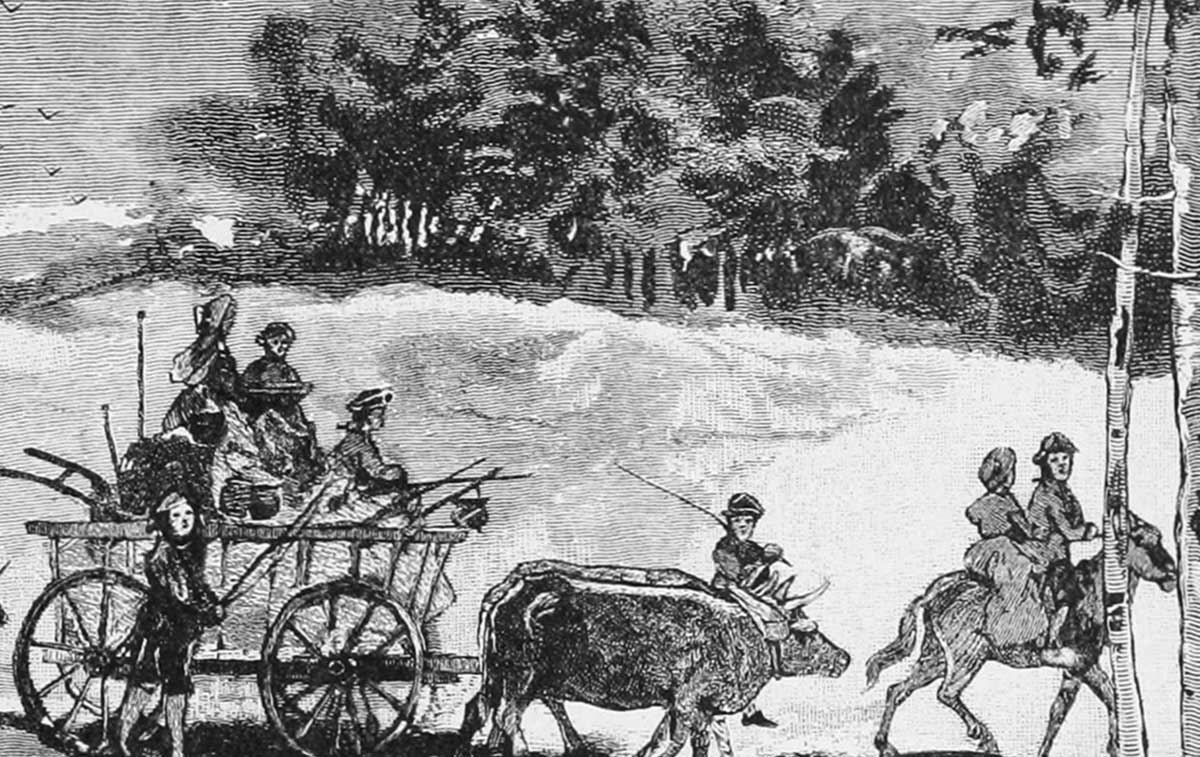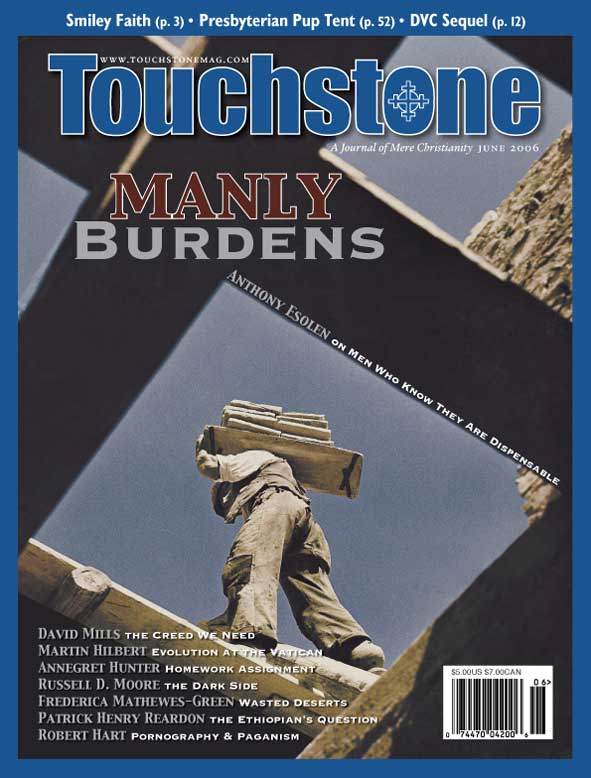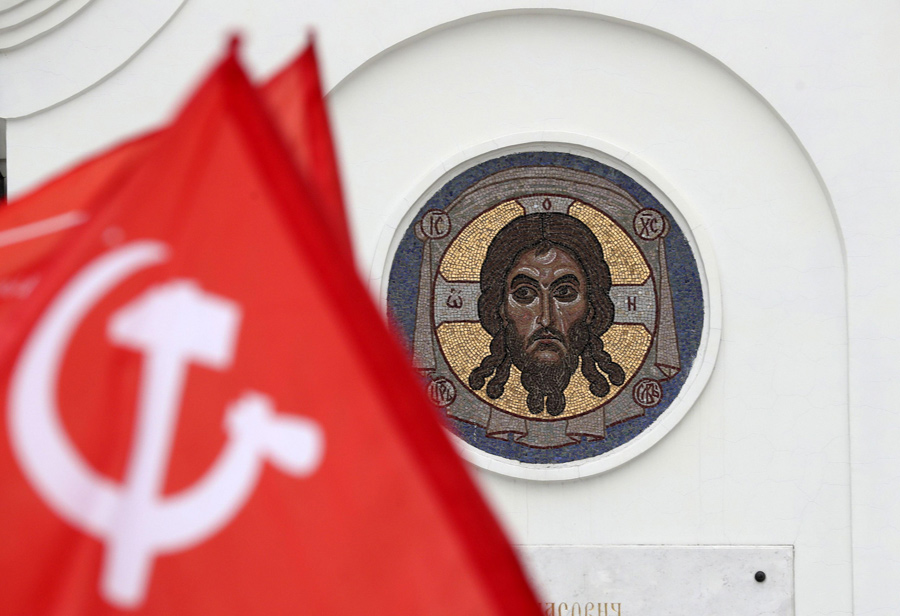View
Lower Than The Idols
Robert Hart on the Superiority of Paganism to Pornography
It was my duty, on one occasion, to meet with a regular customer of the city’s psychiatric wards. I found him living in a small stone enclosure, too poor to be called a slum. He seemed a harmless, shrunken chap, mid-thirties or early forties, quiet and friendly. He invited me in, and I sat on his dilapidated sofa, carefully avoiding the springs that seemed poised to slice through my trousers. He offered me something to drink—an offer to be declined even if one’s tongue is drier than the desert sands. Every gesture of hospitality in such places is best treated as a threat.
Through drawn curtains filtered light revealed that scattered all over the floor were Barbie dolls. “Oh, do you have a daughter?” “No” came the reply. As my eyes grew accustomed to the dark room, I noticed that each of these many dolls, all naked, was mutilated at the breasts in exactly the same way. I finished my professional duties and hurried out of there, emerging from the valley of the shadow back into the sunlight. I was filled with a new concern for the children I passed, and for the women scurrying up and down the sidewalk.
On a later day I met with another psychiatric patient, perhaps a little younger. He was quiet, reserved, and passively friendly. He had a collection of magazines opened and spread out all over his home. It was impossible to sit anywhere without moving some of them out of the way, which meant touching them. I chose to stand.
On that day I learned the current street usage of the word “pornography.” The feeling it produced was not desire but nausea. It did not reflect the awe men have for female beauty. The pictures this troubled mind relished and collected distorted natural beauty into something ugly, like the other man’s collection of mutilated Barbie dolls. No Venus here, and not the wife of Rembrandt posing as Bathsheba. Nothing in that display spoke of worship, or of love, or of nature.
Distorted Beauty
I would like to think that such individuals are rare, the unfortunate victims of mental illness, but evidence to the contrary is all too abundant. The most profitable business on the Internet is pornography, and the standard has, I have read, become increasingly violent and perverse. The pornographic tastes of these two mental patients were symptoms of their condition (and I have selected only two out of many such patients I have known). What must we conclude from the fact that they share these symptomatic tastes—in kind if not in degree—with a significant number of our neighbors?
From all appearances, both men were depressed, pathetic, lonely. What they did, however secret and hidden away, was very much like the sin of many people of whom I have written before, those who frequent the strip joints of the infamous Baltimore “Block,” who choose to ignore the medical and economic realities—the poverty, abuse, heroin addiction, and AIDS suffered by the poor girls who debase themselves to entertain them—that create the ongoing supply for their never-ending demand.
St. Paul wrote, in the first chapter of his Epistle to the Romans, that worship of the creature instead of the Creator leads to every kind of sexual disorder. He is telling us that worship of the creature is lower than other forms of idolatry. The men who are addicted to various forms of pornography and voyeurism have sunk beneath the worship of transcendent beings to that of created things, and then lower into disordered passions.
Is worship of the creature quite the same as worship of any sort of god, false god though it may be? St. Paul told the Ephesians that even covetousness is a form of idolatry (Eph. 5:5). But to worship things within our grasp debases human nature in the mind of the worshiper, for it places oneself below the level of an object of lust.
We can read about the worship of the sky, the sacrifice of children to Molech, and bowing the knee to Baal. Yet as terrible as all that was (even the sacrifice of children), worship of the gods was, for the pagan, a reverence for something higher and more powerful than himself, something at least partially transcendent and beyond him. It was too far for him to reach, beyond his power to covet.
The sin of the pornography addict is not on a ground of moral sensitivity high enough to equal the idolatry of the honest pagan. These porn enthusiasts have lost the power to worship, having no longer within themselves the part of human nature that can look up to an object of worth. They like, rather, to debase.
Pagan & Pornographer
A pagan knows that he is not master of his fate, or of the world’s fate, and that he must account for his life. He simply does not know how. We can teach him how, and bring him good news. St. Patrick was able to convert a nation from the slavish worship of fierce and hateful gods to the loving Father of our Lord Jesus Christ. They needed to offer no more human victims to those gods, but rather thanksgiving to the One who sent his Son to suffer and die for mankind.
Not so the man who has fallen into that “given over” state spoken of by St. Paul. He knew the Rome of his day, where life was centered on the “Circus” and its endless entertainment of actual bloodshed. In the ruling metropolis, disordered passion had become enshrined in Caesar’s household as a model for the life of the city. The gods were still given their customary honor, but only alongside the emperor, a man in power regarded as divine.
This power was sought by others who were willing to kill and destroy if they could but attain it. The gods were no longer transcendent, for Caesar was one of them. By grasping, the daring, ambitious, and brutal might become gods themselves.
Yet in Athens, Paul could use the vain superstition of the Greeks to preach the gospel. They feared that any omission in their worship, even to “the Unknown God,” could lead to divine retribution. And so, the apostle found in that misguided but sincere religious devotion a platform upon which to speak. The idolatry of pagans, with its fear and awe, took into account the frailty of man and his dependence on those greater forces which controlled the world, forces he could not control.
The two pathetic psychiatric patients and the Block’s enthusiasts are much too base to be called pagans or idolaters. They have sunk below the pagans of Athens. They have more in common with the Romans at the Circus, those who were entertained by the debasement and mistreatment of persons.
Pornography, like the Roman bloodlust of old, is violent, but it is not the violence of the sacrifices of the worshipers of Baal. It is lower still. The human impulse to worship is a good thing. Even when it is led astray, it reveals the higher and better part of man.
Those who are given over to lust are blind to wonder and awe. They—the patrons of the Block’s strip joints, the two young men—have lost the power to bow down to any god. They cannot hear music to cheer the soul; tragedy brings no tears, comedy no laughter. Their dark houses have scandalous secrets but no shame. They no longer see the good, beautiful, or true.
Better for them to rise to the level of the pagans of Athens, to worship something more powerful than themselves. And so we could tell them of the Unknown God. •
Robert Hart first wrote of the “Block” in “Dead Kids on the Block” in the December 2003 issue (http://touchstonemag.com/archives/article.php?id=16-10-016-v).
Robert Hart is rector of St. Benedict's Anglican Catholic Church in Chapel Hill, North Carolina (Anglican Catholic Church Original Province). He also contributes regularly to the blog The Continuum. He is a contributing editor of Touchstone.
subscription options
Order
Print/Online Subscription

Get six issues (one year) of Touchstone PLUS full online access including pdf downloads for only $39.95. That's only $3.34 per month!
Order
Online Only
Subscription

Get a one-year full-access subscription to the Touchstone online archives for only $19.95. That's only $1.66 per month!
bulk subscriptions
Order Touchstone subscriptions in bulk and save $10 per sub! Each subscription includes 6 issues of Touchstone plus full online access to touchstonemag.com—including archives, videos, and pdf downloads of recent issues for only $29.95 each! Great for churches or study groups.
Transactions will be processed on a secure server.
more on sex from the online archives

28.2—March/April 2015
Man, Woman & the Mystery of Christ
An Evangelical Protestant Perspective by Russell D. Moore
more from the online archives

31.5—September/October 2018
Errands into the Moral Wilderness
Forms of Christian Family Witness & Renewal by Allan C. Carlson
calling all readers
Please Donate
"There are magazines worth reading but few worth saving . . . Touchstone is just such a magazine."
—Alice von Hildebrand
"Here we do not concede one square millimeter of territory to falsehood, folly, contemporary sentimentality, or fashion. We speak the truth, and let God be our judge. . . . Touchstone is the one committedly Christian conservative journal."
—Anthony Esolen, Touchstone senior editor










